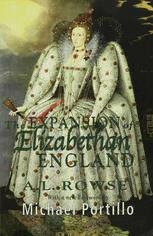
The Expansion of Elizabethan England PDF
Preview The Expansion of Elizabethan England
THE EXPANSION OF ELIZABETHAN ENGLAND Also fry A. L. Rowse THE ENGlAND OF ELIZABETH THE EXPANSION OF ELIZABETHAN ENGLAND Second Edition A. L. Rowse Fellow qf All Souls College, Oiford Foreword by the Rt Hon. Michael Portillo M.P. Si oblitus juero tui Jerusalem, oblivioni detur dextera mea. PSALM. cxxxvi * eA. L Rowse 1955 Foreword Cl Michael Portillo 2003 All rights reserved. No reproduction, copy or transmission of this publication may be made without written permission. No paragraph of this publication may be reproduced, copied or transmitted save with written permission or in accordance with the provisions of the Copyright, Designs and Patents Act 1988, or under the terms of any licence permitting limited copying issued by the Copyright Licensing Agency, 90 Tottenham Court Road, London W1T 4LP. Any person who does any unauthorised act in relation to this publication may be liable to criminal prosecution and civil claims for damages. The authors have asserted their rights to be identified as the authors of this work in accordance with the Copyright, Designs and Patents Act 1988. First published in 1955 by Macmillan & Company Ltd Published in 1981 by Papermac, a division of Macmillan Publishers Ltd, London and Basingstoke Reissued with a new foreword by Michael Portillo 2003 by PALGRAVE MACMILLAN Houndmills, Basingstoke, Hampshire RG21 6XS and 175 Fifth Avenue, New York, N.Y. 10010 Companies and representatives throughout the world PALGRAVE MACMILLAN is the global academic imprint of the Palgrave Macmillan division of St. Martin's Press, LLC and of Palgrave Macmillan Ltd. Macmillan• is a registered trademark in the United States, United Kingdom and other countries. Palgrave is a registered trademark in the European Union and other countries. ISBN 978-1-4039-0813-1 ISBN 978-0-230-59713-6 (eBook) DOI 10.1057/9780230597136 This book is printed on paper suitable for recycling and made from fully managed and sustained forest sources. A catalogue record for this book is available from the British Library. 10 9 8 7 6 5 4 3 2 1 12 11 10 09 08 07 06 05 04 03 To T. S. EUOT who g(JJ)e me my first introduction to the world qf letters This page intentionally left blank CONTENTS PAGE FOREWORD BY MICHAEL PORTILLO ix PREFACE XV CHAP. I. THE BORDERLANDS: THE SCOTTISH BORDERS AND CORNWALL II. THE BORDERLANDS: WALES 45 III. IRELAND: A CELTIC SOCIETY IN DECLINE 90 IV. IRELAND: COLONISATION AND CONQUEST 126 V. OCEANIC VOYAGES 158 VI. AMERICAN COLONISATION 206 VII. THE SEA-STRUGGLE WITH SPAIN 238 VIII. THE ARMADA AND AFTER 266 IX. WAR ON LAND: MILITARY ORGANISATION 327 X. INTERVENTION IN THE NETHERLANDS 374 XI. THE IRISH WAR 415 INDEX 439 VII This page intentionally left blank FOREWORD Q UEEN Elizabeth I of England commanded adulation from her courtiers and people. She deployed a bewildering range of talents. She knew how to command, and understood instinctively how to make use of the symbols of authority. She manipulated her portrait painters to present an image of herself as serene and self-assured, whereas she could be excitable and lack ing in self-confidence. She used the advantages of her sex shame lessly. The men around her were often besotted: either literally in love with her, or lured into a chivalric charade borrowed from the court of King Arthur. The Queen was brilliant with crowds, and bolstered her posi tion at Court by receiving the direct endorsement of the masses during her royal progresses. She developed the myth of the Virgin Queen, suggesting that she had forgone the joys of sex and child bearing in order to be married to England alone, and to be mother of all its people. That gloss carried a sacrilegious invitation to the throng to worship the Queen, to worship the Virgin. Elizabeth was extremely clever, well read, witty and acerbic. The Queen was a formidable linguist, and took a great interest in world affairs. She had a full grasp of theology, and was admirably versed in astronomy, astrology and mathematics. She was intimate with the goings-on in the royal families of Europe. Elizabeth was intellectually and physically brave. She inherited wisdom and guile from her father, Henry VIII, and as she grew in experience, she became wiser still. Yet she was also often silly, especially with men and over men. She flirted outrageously, threw tantrums and would for long periods refuse to speak to those who upset her. She was tolerant in religious and social matters, believing that only God could judge a man's conscience. When she banished from her Court the men she most admired, for their dalliances with ladies-in-waiting, she did so more out of jealous rage than any sense of a royal duty to punish philanderers. Walter Ralegh was among those to suffer such exile. The bewildering combination of Elizabeth's personal qualities IX
